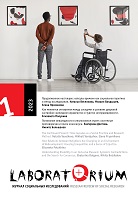Витязь на распутье: российские исследования памяти на рубеже 2010–2020-х годов
Knight at the Crossroads: Russian Memory Studies from 2010s to 2020s
Author(s): Aleksandr Fokin, Dmitry KozlovSubject(s): Recent History (1900 till today), Present Times (2010 - today), Politics of History/Memory
Published by: Центр независимых социологических исследований (ЦНСИ)
Keywords: Great Patriotic War; Historical Memory; Historical Policy; “Memory Boom”; Memory Studies; Public History; Soviet History; Soviet Political Repressions;
Summary/Abstract: The essay explores the transformation of memory studies in Russia from the 1980s until present day. It focuses on its intersections with oral history, new imperial history, and new intellectual history, and its key question is how academic historians in contemporary Russia redefine their role in public discussions of the Soviet past under the conditions of the “memory boom,” which in Russian context is characterized by the high level of public attention to two major “difficult questions of the past”- the Great Patriotic War and political repressions in the Soviet Union. The essay investigates these questions through the analysis of several recently published monographs on historical memory and politics of history. Specifically, this essay looks at three books: An Inconvenient Past: Remembering State Crimes in Russia and Other Countries (by Nikolai Epple); Monument and Celebration: The Ethnography of Victory Day (edited by Mischa Gabowitsch); and Memory Politics in Contemporary Russia and Eastern European Countries: Actors, Institutions, Narratives (edited by Aleksei Miller and Dmitrii Efremenko). These books, in our view, most vividly demonstrate how the professional community of Russian historians has redefined its role in the space of public debate. Using the metaphor of the ”knight at the crossroads,” our analysis aims to show that we are facing three models not only of academic debate about approaches to memory studies but also of the transformation of researchers into actors of the politics of history. From the analysis of these books, we discern several trends with which, by the beginning of 2022, the memory studies community has defined its role in the space of public debate: (1) memory studies is moving outside of the academic community into a wider public context, whereby the transition from history of memory to public history is taking place and the authors of the works themselves become actors in policymaking related to history; (2) large collective projects are emerging, which allow to cover a vast geography of memory and thus record and show the significance of local specificity of commemorative practices; (3) closure of memory reflection within national borders is being overcome, and instead comparative studies are emerging; (4) rejecting the search for a universal model of memory and recognizing the intrinsic differentiation of the field.
Journal: Laboratorium. Журнал социальных исследований
- Issue Year: 15/2023
- Issue No: 1
- Page Range: 75-99
- Page Count: 25
- Language: Russian

